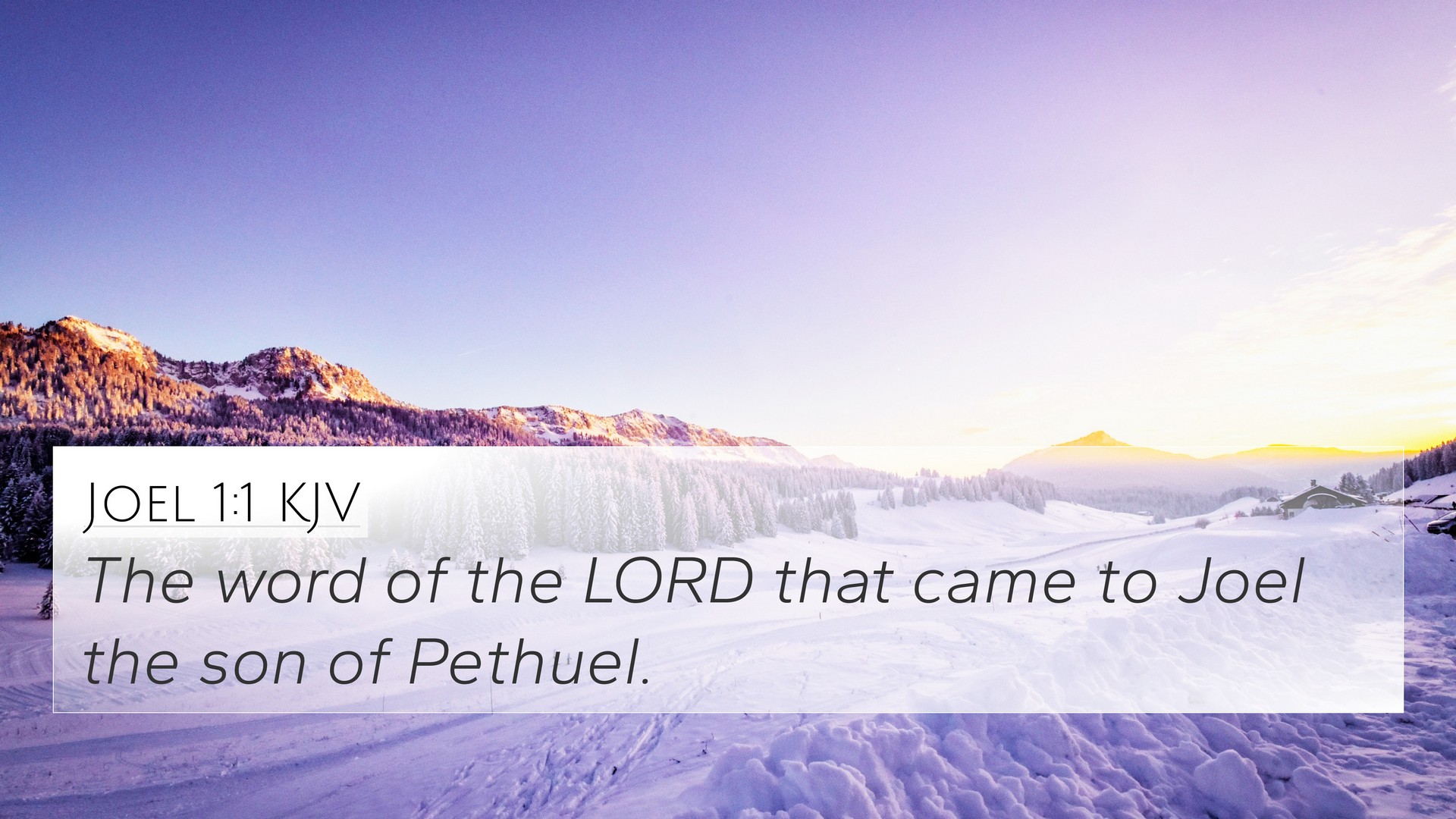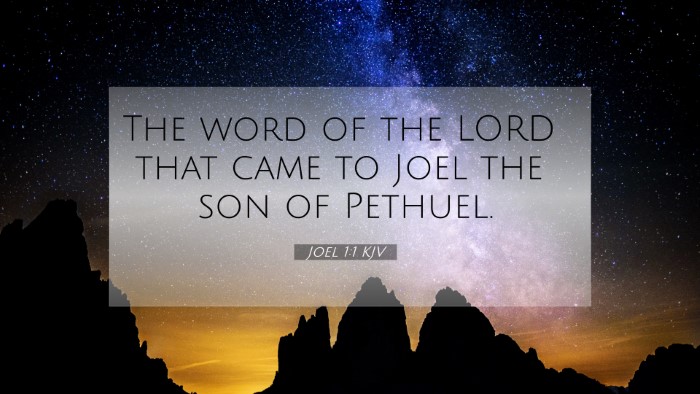Old Testament
Genesis Exodus Leviticus Numbers Deuteronomy Joshua Judges Ruth 1 Samuel 2 Samuel 1 Kings 2 Kings 1 Chronicles 2 Chronicles Ezra Nehemiah Esther Job Psalms Proverbs Ecclesiastes Song of Solomon Isaiah Jeremiah Lamentations Ezekiel Daniel Hosea Joel Amos Obadiah Jonah Micah Nahum Habakkuk Zephaniah Haggai Zechariah MalachiJoel 1:1 Similar Verses
Joel 1:1 Cross References
The word of the LORD that came to Joel the son of Pethuel.
Uncover the Rich Themes and Topics of This Bible Verse
Listed below are the Bible themes associated with Joel 1:1. We invite you to explore each theme to gain deeper insights into the Scriptures.
Joel 1:1 Cross Reference Verses
This section features a detailed cross-reference designed to enrich your understanding of the Scriptures. Below, you will find carefully selected verses that echo the themes and teachings related to Joel 1:1 KJV. Click on any image to explore detailed analyses of related Bible verses and uncover deeper theological insights.
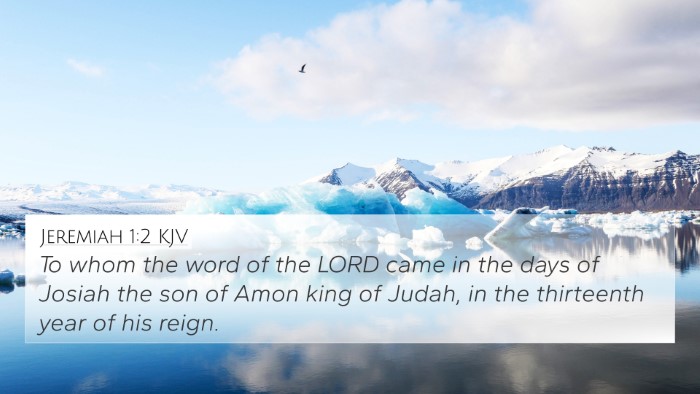
Jeremiah 1:2 (KJV) »
To whom the word of the LORD came in the days of Josiah the son of Amon king of Judah, in the thirteenth year of his reign.
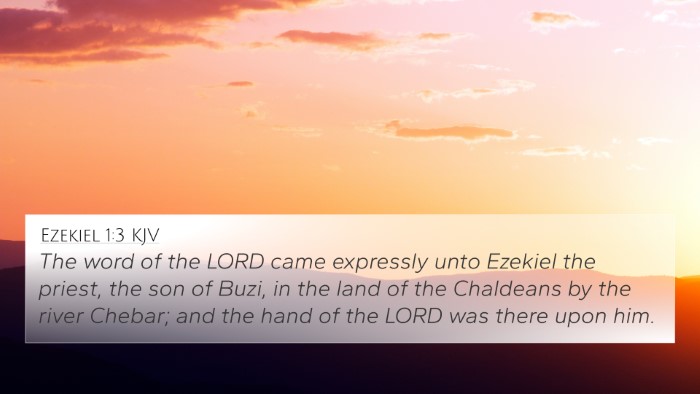
Ezekiel 1:3 (KJV) »
The word of the LORD came expressly unto Ezekiel the priest, the son of Buzi, in the land of the Chaldeans by the river Chebar; and the hand of the LORD was there upon him.
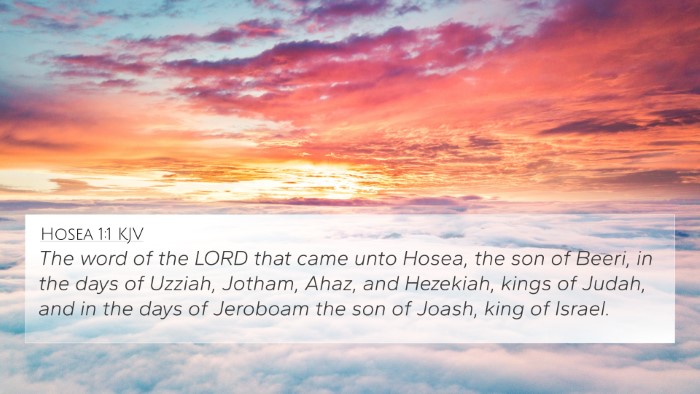
Hosea 1:1 (KJV) »
The word of the LORD that came unto Hosea, the son of Beeri, in the days of Uzziah, Jotham, Ahaz, and Hezekiah, kings of Judah, and in the days of Jeroboam the son of Joash, king of Israel.
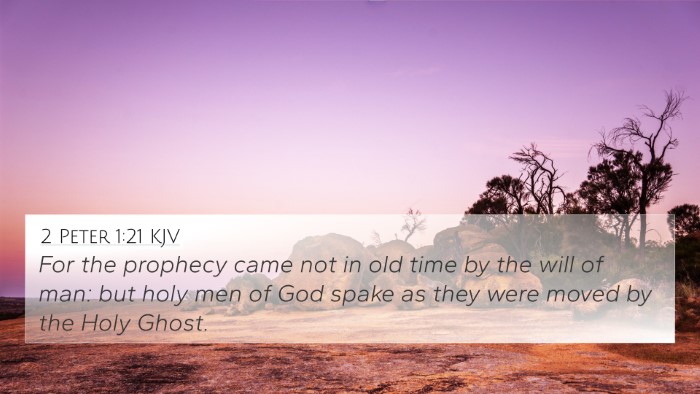
2 Peter 1:21 (KJV) »
For the prophecy came not in old time by the will of man: but holy men of God spake as they were moved by the Holy Ghost.
Joel 1:1 Verse Analysis and Similar Verses
Understanding Joel 1:1
The verse Joel 1:1 reads: “The word of the LORD that came to Joel the son of Pethuel.” This introductory verse sets the stage for the prophetic message that follows. It provides critical context for understanding the overarching themes and specific messages throughout the Book of Joel.
Summary of the Verse
This verse introduces the prophet Joel and establishes his authority as a messenger of God. The emphasis on the divine origin of his message underscores the importance of what Joel is about to proclaim. The mention of his lineage, being the son of Pethuel, may indicate the continuation of prophetic lineages within Israel.
Interpretations from Commentaries
Multiple biblical commentators provide insights into the significance of Joel 1:1:
- Matthew Henry: Henry notes that the phrase "the word of the LORD" signifies divine communication. He emphasizes that Joel's role is not self-appointed but comes directly from God's will.
- Albert Barnes: Barnes highlights that the name 'Joel' means "Yahweh is God," indicating the purpose of the message: to reaffirm the sovereignty of God amidst challenges.
- Adam Clarke: Clarke focuses on the actions of the people of Judah during Joel's time, suggesting that this message reflects their dire circumstances and the need for repentance.
Key Themes in Joel 1:1
- Divine Revelation: The verse indicates that the words spoken are not of human origin but are inspired by God, which forms the foundation of the prophetic tradition.
- Prophetic Authority: By situating Joel within a historical context and lineage, it emphasizes the continuity of God’s message throughout generations.
- Call to Action: The prophetic word often includes warnings and calls to repentance, which will be developed throughout the Book.
Bible Verse Cross-References
Understanding Joel 1:1 can be enriched by examining related scriptures. Here are some cross-references that illuminate its themes:
- Amos 3:7: "Surely the Lord GOD does nothing, unless He reveals His secret to His servants the prophets."
- Isaiah 1:1: "The vision of Isaiah the son of Amoz, which he saw concerning Judah and Jerusalem..." - highlights the role of vision in prophetic messages.
- Micah 1:1: "The word of the LORD that came to Micah of Moresheth..." - similar introduction showcasing God's communication through prophets.
- Jeremiah 1:4-5: "Then the word of the LORD came to me, saying: 'Before I formed you in the womb, I knew you...'" - reinforces the divine calling of prophets.
- Zechariah 1:1: "In the eighth month of the second year of Darius, the word of the LORD came to Zechariah..." - connects the prophetic timing and context.
- 2 Peter 1:21: "For prophecy never came by the will of man, but holy men of God spoke as they were moved by the Holy Spirit." - highlights the divine source of prophecy.
- Hebrews 1:1: "God, who at various times and in various ways spoke in time past to the fathers by the prophets..." - emphasizes God's method of communication with mankind through prophets.
Connections Between Bible Verses
Through comparative Bible verse analysis, we see that Joel 1:1 functions as a nexus for understanding the role of prophets in the Biblical narrative. The inter-Biblical dialogue between prophets illustrates God's steadfastness in delivering His message to humankind:
- Thematic Bible verse connections: Prophets across the scriptures bring similar messages of warning and hope, like Joel.
- Bible verses that relate to each other: Understanding the prophetic nature of Joel relates to the messages of hope found in the Epistles.
- Cross-referencing Biblical texts: Exploring the contexts of each prophetic book enhances the reading of Joel and understanding its message.
Tools for Bible Cross-Referencing
To explore the connections around Joel 1:1 and similar verses, various tools are beneficial:
- Bible concordance: A handy resource for finding themes and keywords across scripture.
- Bible cross-reference guide: Provides systematic approaches to locate biblical parallels.
- Bible chain references: Allows readers to follow threads of themes throughout the scripture.
Conclusion
In summary, Joel 1:1 functions as a vital introduction to the biblical message delivered by the prophet Joel. By employing scriptural cross-referencing and exploring its connections with other scriptures, one can gain a deeper understanding of its significance in the overall biblical narrative. The study of this verse and its cross-references not only highlights God's ongoing communication with His people but also frames our context for repentance, hope, and divine sovereignty.
